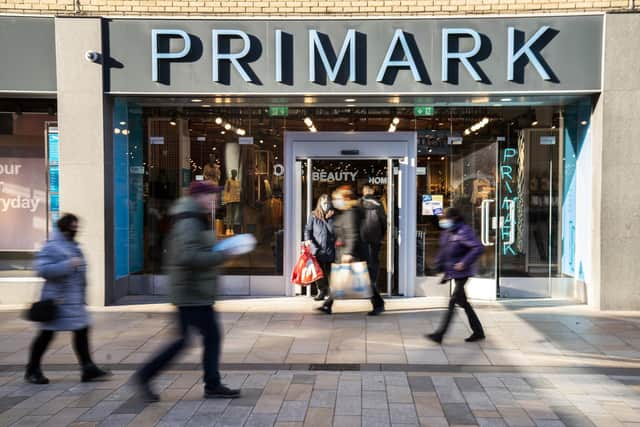Primark drives strong sales at AB Foods as shoppers shrug off price increases
Associated British Foods which also runs large grocery, ingredients and agriculture operations, said the backdrop is still “challenging” for consumers but stressed that it has seen inflationary pressure ease over the past year.
It said company profits jumped by a quarter to £1.34bn over the year to September 16, compared with a year earlier, as it was boosted by Primark.
Advertisement
Hide AdAdvertisement
Hide AdAB Foods added that profit from the fashion retailer, which has 432 shops globally, is set to see profits rise further as it benefits from lower raw material and freight costs.


During the past year, Primark implemented “selective price increases” for shoppers after reporting a spike in costs to make products and operate shops.
On Tuesday, the group revealed that Primark sales surpassed expectations from last year as demand increased across its markets despite the increased pricing.
Primark sales grew by 15 per cent to £9bn for the year, with 11 per cent growth in the UK.
Advertisement
Hide AdAdvertisement
Hide AdIt highlighted the sales performance in the face of poor weather conditions over the final half of the year, which impacted high street footfall.
As a whole, AB Foods group revenue increased by 16 per cent to £19.7bn for the year, as it was also boosted by higher pricing in other areas.
Sales in its grocery business, which includes brands such as Twinings, Ryvita and Patak’s, grew by 12 per cent to £4.2bn after passing higher costs on to consumers.
It said this division was buoyed by an improved performance in its Allied Bakeries business, which makes Kingsmill bread.
Advertisement
Hide AdAdvertisement
Hide AdHowever, AB Foods said Ryvita continued to “underperform” over the year but has seen early positive results following a brand relaunch.
George Weston, chief executive of Associated British Foods, said: “At the outset of this financial year the group was facing very significant economic challenges caused in part by major geo-political events.
“Looking back on the year, it is clear to me that the group performed extremely well and is as a result now well positioned for the year ahead.”
Further insight into the health of the UK economy was provided by the Bank of England last week. UK interest rates were held at 5.25 per cent as the Bank said it is “much too early” to think about cutting borrowing costs, despite giving a bleak outlook for the economy.
Advertisement
Hide AdAdvertisement
Hide AdThe Bank’s governor, Andrew Bailey, insisted that households and businesses will feel more pain if price rises do not ease.
The Bank’s Monetary Policy Committee (MPC) voted by a six-three majority to keep the base rate at 5.25 per cent. Three members preferred to increase rates to 5.5 per cent.
Speaking last week, Mr Bailey said: “Let me be clear, there is absolutely no room for complacency. Inflation is still too high.”
“We will keep interest rates high enough for long enough to make sure we get inflation all the way back to the 2 per cent target.
“We will be watching closely to see if further increases in interest rates are needed. But even if they are not, it is much too early to be thinking about rate cuts.”